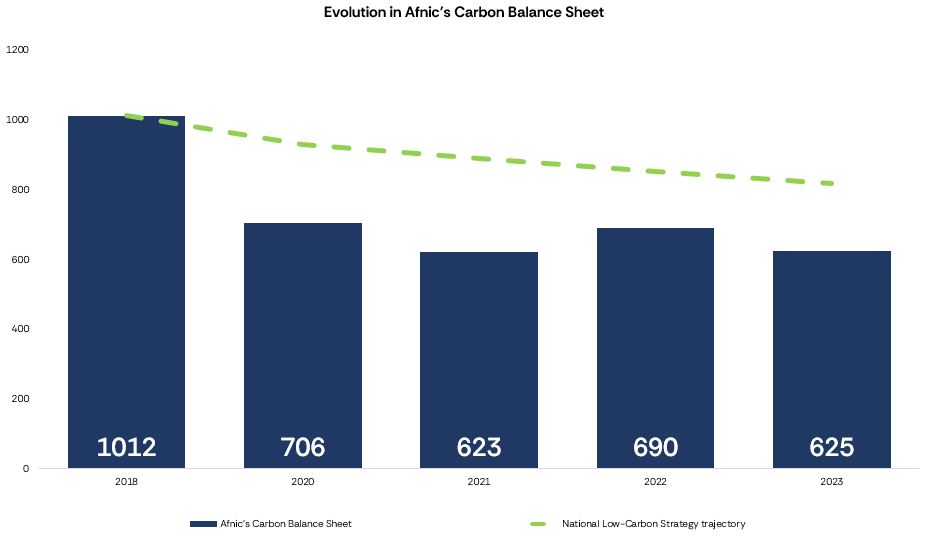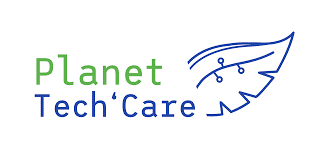Afnic’s Carbon Balance Sheet
Because we are aware of the environmental impact of digital activities, we conducted our first carbon footprint assessment and established a plan to reduce our greenhouse gas emissions as of 2013.
From this first measurement of our impact, Afnic aligned itself with the global targets for greenhouse gas (GHG) emission reductions, namely those of the Kyoto Protocol, i.e. a 20% reduction over 10 years.
These goals were achieved and Afnic set a reduction target in 2022 aligned with the National Low Carbon Strategy, i.e. a 40% reduction in its emissions by 2030.
Afnic’s carbon balance sheet was down by 9% between 2022 and 2023 and by 38% in 5 years thanks to the GHG emission reduction plans:
- Responsible purchasing policy
- Travel policy
- Energy management
- Sustainable IT
At 31 December 2023, the carbon footprint of the management of a domain name managed by Afnic stood at 147 gCO2e.

Plan to reduce GHGgreenhouse gas emissions
Besides the introduction of the CSR management system based on ISO 26000, in the Agreement it signed with the French State for the management of the .fr TLD, Afnic committed to implementing a plan to reduce its GHG emissions with the aim of reaching a carbon footprint of not more than 750 tCO2e by 2017. By way of indication, the objective set internally for 2023, validated by the Board of Trustees, was even more ambitious, at 690 tCO2e. This target was reached in 2023 with a carbon footprint of 625 tCO2e.
In order to set its reduction in the long-term context, Afnic tracks the trends in its carbon balance sheet over the years by including it in the reduction trajectory of the French National Low Carbon Strategy (see graph Evolution in Afnic’s Carbon Balance Sheet).
Tracking trends per FTE (full-time equivalent) and per domain name managed allows Afnic to make sure of the continued reduction in the context of the development of its workforce and of its activities.
Contribution to global carbon neutrality
Another of Afnic’s commitments in the 2022/2027 Agreement with the State was to reach carbon neutrality by putting in place a carbon offset policy. Thus in 2023, to offset the 2022 carbon footprint (690 tCO2e), Afnic’s members decided to support two projects:
- A Low Carbon Label (“Bas Carbone”) project – CarbonAgri aimed at accompanying the transition between 2021 and 2026 of a dairy operation in Désertines (Allier). Specifically, the operation has ceased mineral fertilisation of the soil and switched to organic agriculture, with a 100% grass system and shifting to a single milking per day to reduce milk deliveries and sharply reduce energy consumption. This Low Carbon Label project is managed by Agoterra. Afnic contributed 393 tCO2e for an amount of €20,436.
- A technological carbon sequestration project managed by Inuk: a thermal solar power plant now supplies the electricity for the heat networks of the town of Issoudun (Indre département of France), which, by replacing gas, avoids the production of GHG. This project is operational. Afnic contributed 297 tCO2e for an amount of €8,019.
In 2024, to offset the 2023 carbon footprint of 625 tCO2e, Afnic, with the aid of EcoTree, chose to support the Tour d’Auvergne forestation and reforestation project in Puy-de-Dôme, a symbolic department for biodiversity and climate regulation: 4,750 trees, selected for their hardiness and their contribution to biodiversity, will be planted to reconstitute forest stands, restore biodiversity and improve the region’s ecological resilience. Afnic is contributing €25,000 to this project, the equivalent of the 625 tCO2e of its 2023 carbon footprint.
This project will concentrate on the forestation and reforestation of the zone, with the planting of trees selected for their hardiness and their contribution to biodiversity. The initiative aims to restore a healthy and resilient forest ecosystem capable of regenerating itself and sustaining a rich diversity of life. The actions also provide for appropriate management of the trees to maximise their ecological and economic potential while at the same time making sure they are adapted to the future climate and can withstand disease and bugs.
Protection and rehabilitation of biodiversity
Over and above the carbon contribution, and because the fight against climate change is not confined to the sequestration of greenhouse gases, we have voluntarily opted to support the EcoTree Fund for Biodiversity in the amount of €7,000. The fund aims to strengthen terrestrial biodiversity in ecosystems spread throughout France by means of various projects: bat conservation in the forest of Préaux (Mayenne), restoration of two wetland areas in Ploërdut (Morbihan), actions in favour of birds in the forests of Ruillé and Pontvallain (Sarthe), creation of 42 biodiversity enclaves in Monceaux-sur-Dordogne (Corrèze) and actions in favour of pollination.
Afnic, a committed actor in the responsible digital ecosystem
| Afnic sits on the Digital and Environment committees of Numeum and in 2023 became a signatory to Planet Tech’Care led by Numeum, Planet Tech’Care is the first initiative to bring together a network of partners (professional organisations, schools, innovation centres, associations, foundations, think tanks), which aims to support companies wishing to integrate digital technology into their environmental trajectory and to support training players in developing skills in sustainable IT. |  |



